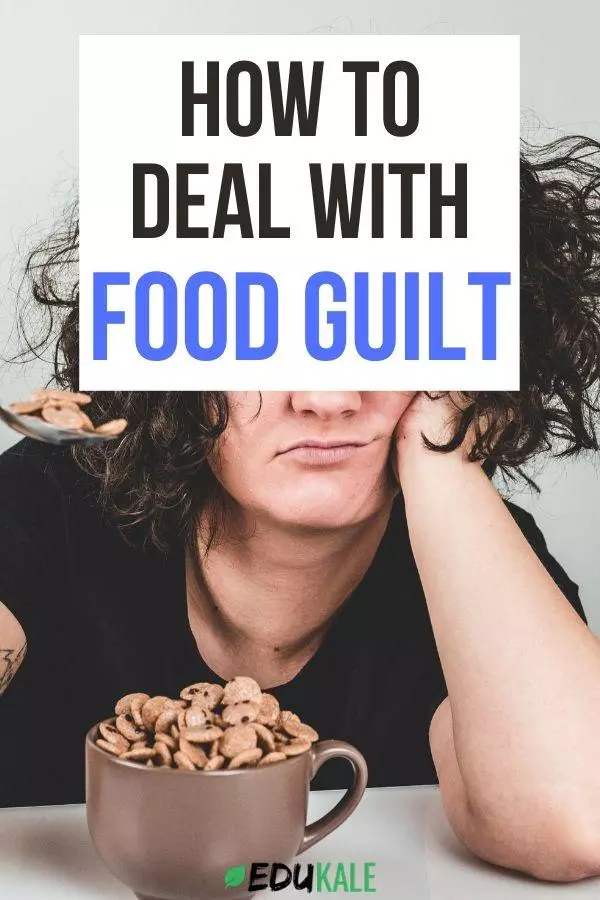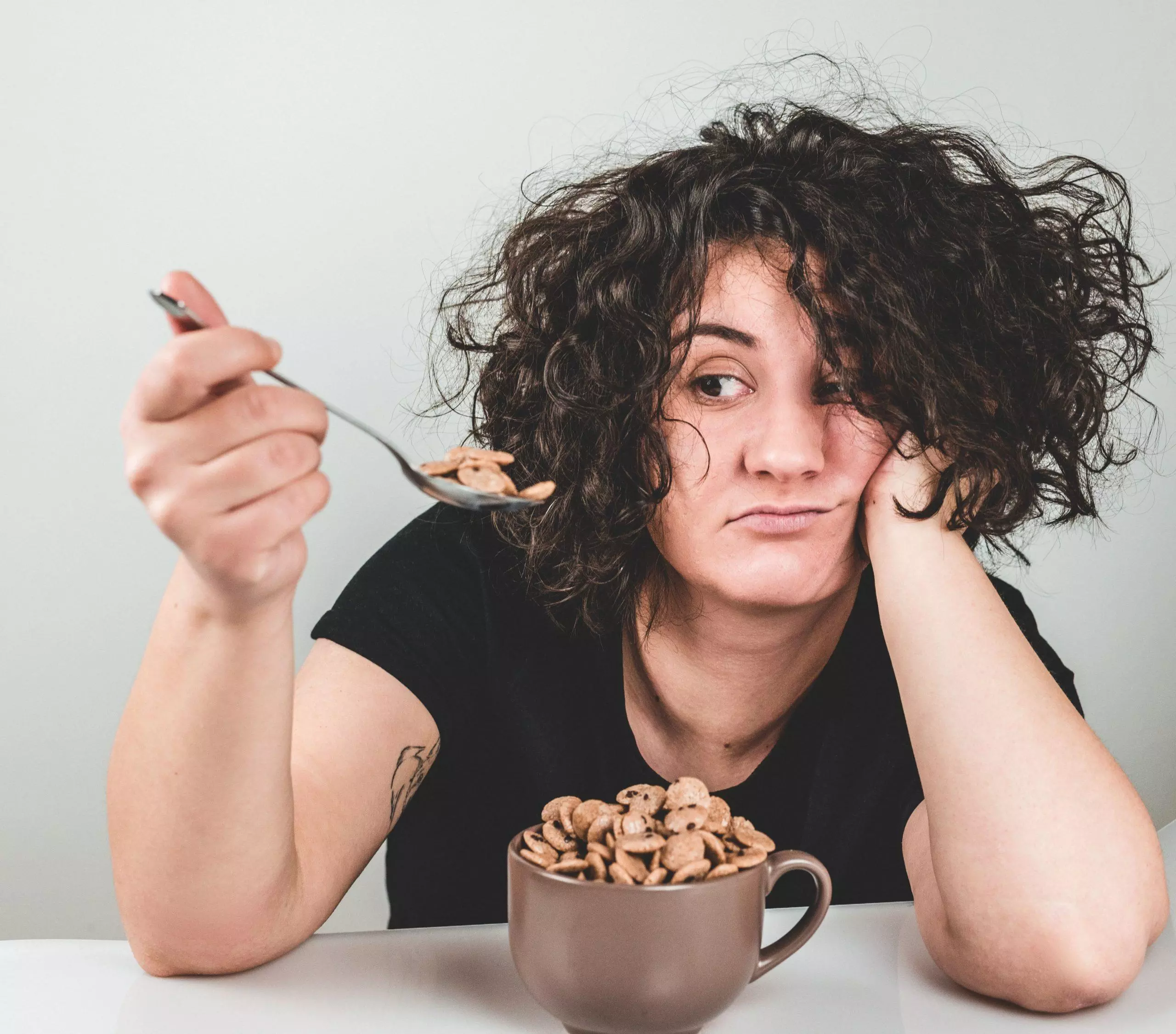This post contains affiliate links from which I may receive a small commission, at no extra cost to you. In no way does this affect my opinion or the information I provide on the product. Please read my disclaimer for more info.
Food guilt is that terrible feeling that creeps in after you’ve had an extra slice of pizza or too many cookies.
It’s the little voice in your head telling you that you should have chosen the salad instead of the burger or had water instead of soda.
But this voice is actually detrimental and is doing you a great disservice. So how can you shut that voice down and overcome food guilt?
What is food guilt?
In general, feelings of guilt arise after doing something perceived as wrong, or not doing something perceived as right. In a lot of cases, guilt can be a positive emotion because it provides motivation to act better in the future.
However, guilt can also have a negative impact when it is unfounded and leads to actionless remorse. This is what happens with food guilt.

Diet culture has drilled into our minds that certain foods are bad and shouldn’t be eaten. Sure, it’s important to know about nutrition and health and which foods bring you the most benefits.
But it shouldn’t be taken to such an extreme that you are overwhelmed with remorse after each “wrong” food choice. This can have a very negative impact in the long run.
What are the dangers of food guilt?
Food guilt can seem pretty inoffensive but can actually spiral into harmful eating behaviors.
Often, if you feel guilty after eating a certain food, you will start restricting what you eat next in order to “compensate”.
Because of this, your body won’t be getting the necessary nutrients. It will then desperately need energy, and will probably lead you down the binge-eating road. Check out this article if you want to learn how to overcome binge-eating.
Food guilt can also lead to the all-or-nothing mentality, which is things are either seen as “all good” or “all bad”. The things that aren’t perfect are considered as a failure. This way of thinking prevents you from eating in moderation, trapping you in a restrict-then-binge cycle.
For instance, if you have a donut and feel overwhelming guilt about it, you might think that eating healthily after that is pointless because you’ve “wrecked your diet”. So you continue to eat more donuts and end up having an entire “cheat day”.
All rational thinking is thrown out the window: you know that eating a bit more than you planned will not be undone by eating even more. Yet you do it anyway.
Check out this article if you’re interested in learning more about the all-or-nothing mentality and how to stop it.

How to deal with food guilt.
So now that you know all about what food guilt is and its problems, how can you overcome it?
First off, you don’t have to sweep up all of these feelings under the rug. You can acknowledge that you have over-eaten or had something that wasn’t the best for your health. But you need to do so in a more detached manner and remove it from any negative emotions.
For instance, say you go out to dinner and have much more food than usual. You then have a stomach ache during the night. You can acknowledge that you have over-eaten and that it made your body feel very uncomfortable, and take note to eat less next time.
The following day, if you feel less hungry, you can listen to these cues and have lighter yet balanced and nutritious meals. This is a way to address these signals without turning them into food guilt.
The wrong thing to do would be to feel guilty about enjoying your hearty dinner, have salads the entire day to make up for it, and end the day by bingeing on ice-cream because you’re nutrient deprived.

It’s also important to ditch the diet mentality once and for all. It’s the reason for all of this food guilt in the first place. You wouldn’t feel guilty about eating anything if you weren’t so scared of gaining weight. And you’re only scared of gaining weight because you’re ingrained in diet culture.
If you start allowing yourself to have these “guilty” foods, then you won’t crave them so much anymore, and you won’t binge on them whenever you get the chance. But you can only do that if you’re not terrified of gaining a single ounce.
Dieting also leads to fearing certain foods. A study found that dieters associated typically “unhealthy foods” with feelings of guilt and fear at a much higher rate than non-dieters.
While you move away from dieting, shift towards a more mindful way of eating. Mindful eating is a technique used to regain control over your eating habits. It’s based on mindfulness, a form of meditation.
Eating mindfully means being aware of what you eat, and eating consciously in a healthy and balanced way in order to rediscover taste, flavor, and pleasure. The goal is to create a connexion between body and mind while eating.
This can enable you to listen to what your body needs, to know when you are hungry and when you are full. Mindful eating involves listening to your hunger cues. It means eating slowly, taking the time to chew, and noticing the different textures and flavors of your food.
Eating should be done without any distractions, focused on appreciating your food. Read this article for more information on how to practice mindful eating.
Finally, enjoying foods you love that aren’t typical “health foods” is as important as eating healthy, balanced meals.
Having a pizza night after a difficult week or enjoying a few slices of cake at your sister’s birthday are important for balance. When you do have these “treats”, it’s crucial to associate them with feelings of celebration— NOT feelings of guilt.
A study actually found that people who ate chocolate cake while associating it with guilt had unhealthier eating habits and lower behavioral control over healthy eating than those who associated cake with celebration.

FOOD GUILT IN CONCLUSION
The feelings of guilt you get after eating foods deemed as “bad” or “unhealthy” are neither pleasant nor useful.
There’s no such thing as a perfect diet, and enjoying hamburgers or cookies is part of normal eating. It’s best to enjoy healthy and balanced meals most of the time all while having a few “treats” when you feel like it.
This should always be guilt and shame-free. I also encourage you to ditch the diet mentality and learn about mindful and intuitive eating.
-Lucie


Comments are closed.